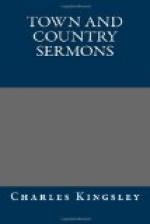And blessed thought, too, that what you do well and lovingly, for God’s sake, will bless you here in this world before you die! Yes, my friends, in the dark day of sorrow and loneliness, and fear and perplexity, you will find old good deeds, which you perhaps have forgotten, coming to look after you, as it were, and help you in the hour of need. Those whom you have helped, will help you in return: and if they will not, God will; for he is not unrighteous, to forget any work and labour of love, which you have showed for his name’s sake, in ministering to his saints. So found Obadiah in that sad day, when he met Elijah.
For he was in evil case that day, as were all souls, rich and poor, throughout that hapless land. For three weary years, there had been no drop of rain: the earth beneath their feet had been like iron, and the heavens above them brass; and Obadiah had found poverty, want, and misery, come on him in the midst of all his riches: he had seen his fair gardens wither, and his olives and his vines burnt up with drought;—his cattle had perished on the hills, and his servants, too, perhaps, in his house. Perhaps his children at home were even then crying for food and water, and crying in vain, in spite of all their father’s greatness.
What was the use of wealth? He could not eat gold, nor drink jewels. What was the use of his power? He could not command the smallest cloud to rise up off the sea, and pour down one drop of water to quench their thirst. Yes, Obadiah was in bitter misery that day, no doubt; and all the more, because he felt that all was God’s judgment on the people’s sins. They had served Baalim and Ashtaroth, the sun and moon and stars, and prayed to them for rain and fruitful seasons, as if they were the rulers of the weather and the soil, instead of serving the true God who made heaven and earth, and all therein: and now God had judged them: he had given his sentence and verdict about that matter, and told them, by a sign which could not be mistaken, that he, and not the sun and moon, was master of the sky and the sea, and the rain and the soil. They had prayed to the sun and moon; and this was the fruit of their prayers— that their prayers had not been heard: but instead of rain and plenty, was drought and barrenness;—carcasses of cattle scattered over the pastures—every village full of living skeletons, too weak to work (though what use in working, when the ground would yield no crop?)—crawling about, their tongues cleaving to the roof of their mouths, in vain searching after a drop of water. Fearful and sickening sights must Obadiah have seen that day, as he rode wearily on upon his pitiful errand. And the thought of what a pitiful errand he was going on, and what a pitiful king he served, must have made him all the more miserable; for, instead of turning and repenting, and going back to the true God, which was the plain and the only way of escaping out of that misery, that wretched King Ahab seems to have cared for nothing but his horses.




